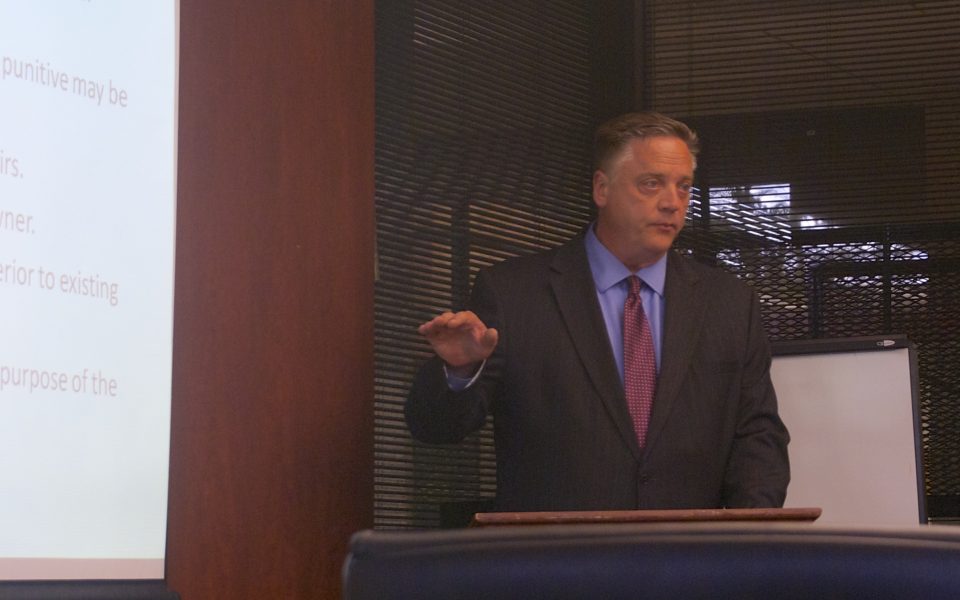by Eric Ginsburg
Greensboro City Council will consider changes to the city’s minimum housing-enforcement ordinance that will lessen penalties but that staff hopes will lead to greater compliance.
In a little more than a year, landlords out of compliance with the city’s minimum housing standards have racked up a bill exceeding $800,000. And of that, almost none of it has been collected.
At a city council work session last week, City Attorney Tom Carruthers asked council to consider changes to the city ordinance aimed at improving the code compliance rate, which he said is the ultimate goal of minimum housing standards.
“A limited civil penalty or fee has been very efficient at getting the attention of landlords,” he said, as opposed to a $75 a day fine that some noncompliant landlords are hit with. “With a limited fee and limited civil penalty, it acts as a carrot.”
Carruthers suggests scrapping the $75 daily civil penalty, which kicks in after a unit is condemned. One reason, he outlined at the June 23 work session, is that the city realized that not only is it unlikely to win if it takes delinquent landlords to court, but Carruthers said state law actually requires that collected punitive fines go to fund public schools and couldn’t be directed back into housing enforcement.
The $75-per-day fine mounts quickly, he said, and becomes counterproductive to the goal of having the property restored. The city of Durham faced a similar problem and revised its ordinances after reaching $1 million in housing fines, Carruthers said.
Other proposed changes would allow the city to take multi-family housing where only some units are condemned before the minimum housing commission. Currently an entire multi-family apartment complex needs to be condemned before appearing before the commission, preventing the city from adequately addressing units in buildings where any apartments are still occupied, Carruthers said.

Bringing all multi-family units under the authority of the minimum housing commission would greatly improve the city’s ability to compel repairs in the affordable housing stock, he said. Mayor Nancy Vaughan said at the work session that such a change is sorely needed in the city.
Carruthers also said city staff would like to enable the city to order repair by the owner if the cost is less than 50 percent of the tax value of the property. If an owner didn’t comply, the city would be able to sue in order to compel the repairs or carry out the repairs itself and seek reimbursement through a priority lien, Carruthers, said.
The proposed new housing code could act as “a power incentive to landlords” because they would realize the benefit of repairing properties themselves, but either result would be a step towards more quality housing, he said.
City leaders will have to think about whether to prioritize the worst offenders, the easiest fixes or possibly properties within a targeted redevelopment area, Carruthers told city council.
Of the more than $800,000 owed to the city in housing-code civil penalties, five ownership groups are responsible for the majority of the unpaid fines. The Agapion family — which owns 400 properties in the county under individual names and Arco Realty — is the worst offender. Irene Agapion previously told Triad City Beat they have no intention of paying, viewing the fines as unenforceable and possibly unconstitutional. The five ownership groups have collectively paid less than $500 of the hundreds of thousands of dollars they owe the city, Carruthers said.
By charging landlords for the cost of repair and cutting the $75 daily fine on noncompliant condemned properties, the city would bring down the penalties to a threshold that isn’t punitive, thereby allowing Greensboro to keep any funds instead of turning the money over to the school system.
The city of Greensboro has no authority over Guilford County Schools —the county government manages public schools.
Justin Outling, who was recently appointed to fill out the remainder of Zack Matheny’s term on city council and who chaired the minimum housing commission up until that point, applauded most of the proposed changes.
Outling called the ideas Carruthers presented “excellent” because they would give the city necessary tools and would be seen as “more business friendly” because they would prevent a property owner from being indefinitely fined and possibly pushed into bankruptcy for noncompliance. He also cautioned about the importance of consistent enforcement if the code changes are passed to avoid any real or perceived unequal treatment.
Councilwoman Sharon Hightower also expressed support for the suggested housing-code changes, saying they give the city increased ability to act and move forward on improving housing stock.
A few other council members asked questions but none expressed concerns or a lack of support. Carruthers said he expects the full proposal will come before council for a vote in July or August.
Join the First Amendment Society, a membership that goes directly to funding TCB‘s newsroom.
We believe that reporting can save the world.
The TCB First Amendment Society recognizes the vital role of a free, unfettered press with a bundling of local experiences designed to build community, and unique engagements with our newsroom that will help you understand, and shape, local journalism’s critical role in uplifting the people in our cities.
All revenue goes directly into the newsroom as reporters’ salaries and freelance commissions.


Leave a Reply